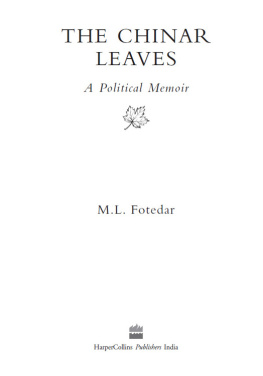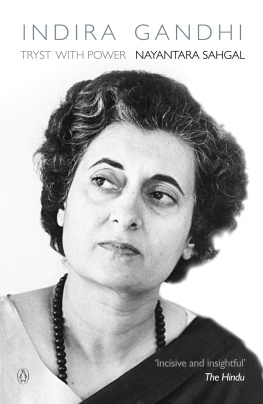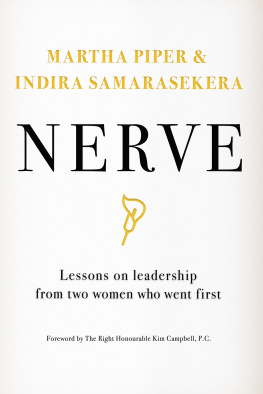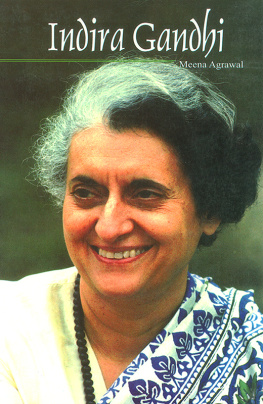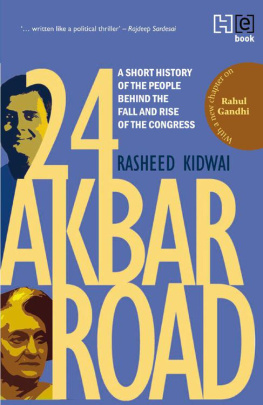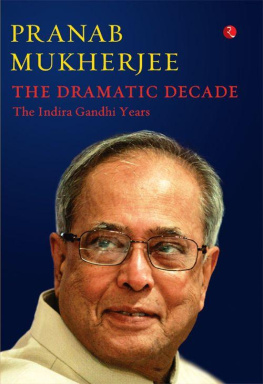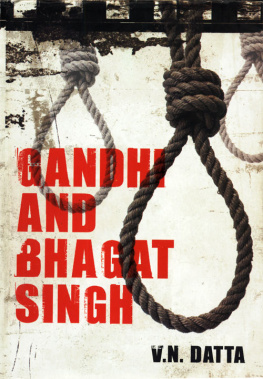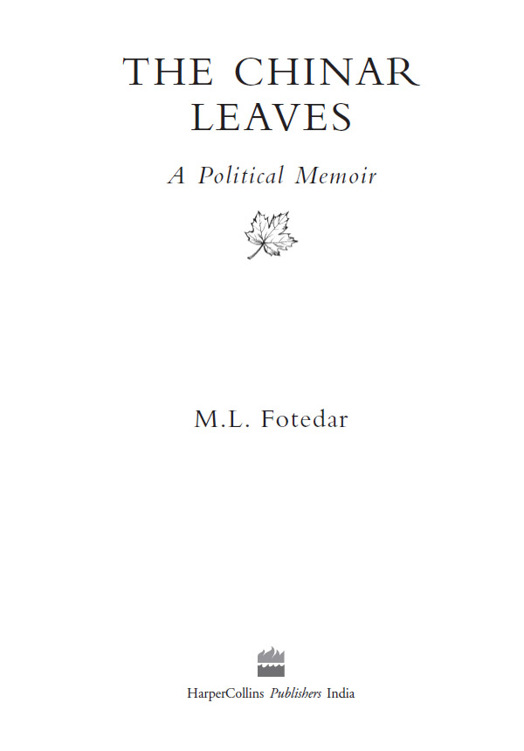This book is the story of my journey that started from a small town in Jammu and Kashmir. This journey was made possible by the affection and support of a large number of friends, well-wishers, family members, party colleagues and workers. I am grateful to all of them for helping me and making invaluable contributions along this eventful journey.
I thank my family, especially my wife Uma Ratan Rani, for their unflinching support. Uma worked silently behind the scenes her whole life. While I spent my time and energy doing party work, she took care of everything else. She has been a storehouse of strength and support for me. My journey has been made possible by her sacrifices.
To write this memoir, I had to select events and memories of a lifetime and organize them in the form of a book. In this process, many people played a part and I am thankful to all of them. I would like to specifically express my deep gratitude to Shri Pankaj Vohra, well-known columnist and journalist, and Shri S.S. Soni, secretary to former President of India Shri Shankar Dayal Sharma, who helped me collate my thoughts and notes. Once the manuscript was ready, there was the tedious job of proofreading and checking and re-checking names, dates and historical facts. For this I must thank my son Arun and his friend Mahendra Ranga. With their hard work, research, thoughtful inputs and insights, they have tried to make the narrative an enjoyable read.
Krishan Chopra, publisher and chief editor at HarperCollins, Siddhesh Inamdar and Rajinder Ganju worked very hard on the book, diligently going through each revised version. I am short of words to thank them for their sincere efforts. A special word of thanks to Bonita Vaz-Shimray for the beautiful cover design and for patiently trawling through a vast collection of photographs to help me make the final selection for this book. I am also indebted to Sanjoy Narayan and Sanjay Malik of HT Media for providing some memorable pictures from their archives.
My son Arun worked closely with me during the writing of this book. He painstakingly shuffled through my large collection of notes and documents, took down dictations from me and typed them out. He also helped me research, collect and verify background information and coordinate with the publishing team. My sincere appreciation for his dedication.
Since 1952, I have had personal experience, through first- hand observation, of many fascinating elements that have gone into the making of our recent political history. These include the leadership of Pandit Jawaharlal Nehru, Mrs Indira Gandhi, Rajiv Gandhi and Mrs Sonia Gandhi; the trends in the thinking of the people and the nature of their urges and aspirations; the dynamics of party politics; the instruments and processes of governance; various emotive issues, events and challenges; the absorbing drama of triumphs and tragedies; trust and treachery and the unfolding of Indias future amidst a complex interplay of international factors.
Now, after more than six decades in public life, I feel a sense of obligation and duty to provide an account of some of the events of contemporary history that I was witness to. I feel this would be one way of sharing the privilege that I had of gaining insights into events, processes and personalities. In some important respects this may enable the reader to get a clearer idea of the thinking that was behind certain decisions, by various personalities of the time, which had a bearing on the life of the people.
Of course, all this is presented as seen from my viewpoint. I therefore thought it appropriate and necessary to acquaint the reader with some information about the region and place I hail from, my family history, my upbringing and education, so that this memoir is seen for what it is: the story told by an individual from an ancient and remote village in the Vale of Kashmir, whom destiny decreed to be associated with some legendary figures in our history for a not inconsiderable period.
1
EARLY YEARS IN KASHMIR
Kashmir has always been vivid in Indias consciousness, as a region of great natural beauty and spiritualism. The exquisitely picturesque image of snowy mountains, rich green forests and meadows, the noble Chinar being caressed by the soft, cool breeze from the mountains, sparkling rivers and serene lakes captivates the minds of all who know Kashmir.
Kashmir has other, and perhaps more significant, blessings. It has a rich history of social and religious harmony and a heritage of ethnic diversity and plurality of social ethos. These are woven into Kashmirs rich culture of arts and craft, costume and cuisine, language, literature, architecture, music and dance. Kashmir is home to sacred shrines and holy places of great antiquity which are revered by all religions. Diverse philosophies and religious traditions have flourished and co-existed harmoniously for centuries, nay, millennia.
According to mythology and legend, the region of the Kashmir valley was a huge lakecalled Satisarand the Rishi Kashyap drained the water of the lake and reclaimed the land, which was then called Kashyap-Mar, and later, Kashmir. The ancient Greeks referred to it tooas Kaspeiria, Kaspatyror, Kaspapyros, and so on. The great Chinese scholar-traveller Hiuen Tsang, who visited Kashmir in 631 AD and stayed for two years engrossed in his scholarly and religious studies, refers to Kashmir as Kia-she-mi-io. It remained part of the Mughal Empire as the summer residence. The famous gardens of Shalimar and Nishat owe their existence to the Mughals. After the Mughals, Kashmir passed on to the Pathans led by Ahmed Shah Abdali. He held it for sixty-seven years through his governors. Kashmir became part of the empire of Maharaja Ranjit Singh in 1819. His death in 1839 proved to be very significant for us. After the close of the first Anglo-Sikh war, Raja Gulab Singh was asked by the British to pay Rs 1 crore as war indemnity. Initially he expressed his inability to do so but later agreed to pay the sum on the condition that he was given a title to the territories. However, he did not take the Chamba area. An abatement of Rs 25 lakh was granted to him for the exclusion, and he ended up paying Rs 75 lakh to the British. The history of the present state of Jammu and Kashmir can be traced back to 1846, when Maharaja Gulab Singh got it leased to him. Gulab Singh was later succeeded by Maharaja Ranbir Singh and Maharaja Pratap Singh. Maharaja Hari Singh ascended the throne in 1925, a few years before I was born.
My family hails from the Valley of Kashmir. It is said that our ancestors shifted to the Kashmir Valley in Rainawari after leaving their settlements on the bank of the legendary Saraswati river. The surname Fotedar came to be acquired because one of our forefathers was the custodian of the states treasury fot is Persian for treasury, and dar for charge.
There is a charming story as to how my forefathers settled in Mattan in Anantnag district. It is said that displaced by some political or other developments, our forefathers were migrating from Rainawari in Srinagar to a safer place. When they reached the village of Wanpuh, now on the SrinagarJammu National Highway, 3 km from Anantnag, further movement was blocked because heavy snowfall had closed down the Banihal Pass. This meant an enforced halt for several months before the pass reopened. While they waited, members of the party were enthralled by the surrounding environment. They found clear warm-water springs, and in the nearby village of Mattan, the beautiful Lidder river flowing by.

